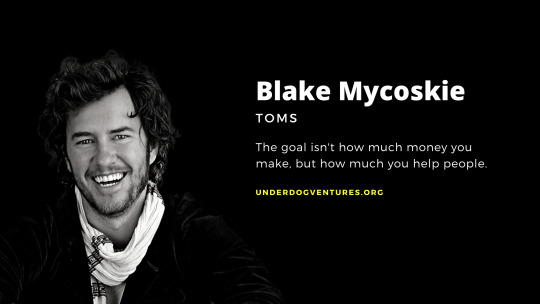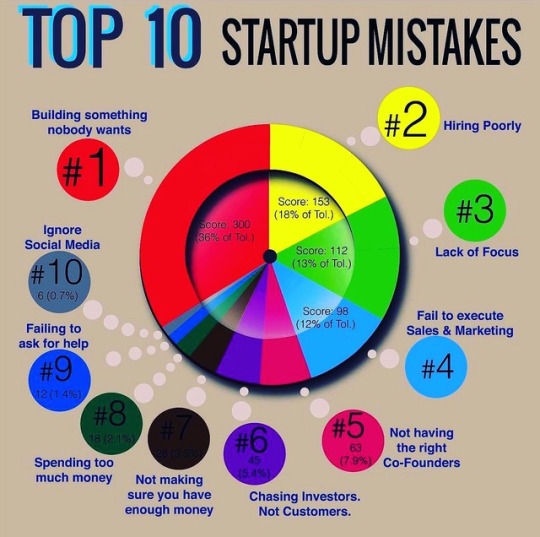Link
#startups#developers & startups#startup#entrepreneur#entrepreneurship#startingup#business#marketing#fundraising#venture capital#hiring#talent#press#pr#growth#growth hacking
3 notes
·
View notes
Text
EQ vs IQ featuring Steve Jobs
I built Underdog Ventures to curate advice from the world’s best entrepreneurs, investors, and leaders on breaking the mold. Worst kept secret: it’s free. Sign up today for 1,000+ free resources for starting-up 🚀
Today I wanted to take a look back at one of my favorite clips from the 1997 Apple Worldwide Developers Conference. Midway through the keynote, a gentleman in the audience stands up and takes a stab directly at Steve Jobs, insulting not only his intelligence, but also Jobs' work ethic and leadership capabilities. In the following response, Steve Jobs showcases that great leaders are not only smart, they're also emotionally intelligence and able to connect with people that [for all intents and purposes] vehemently disagree with them. Please take a moment to watch the clip below and take a look a the five lessons we can learn from Steve Jobs' leadership that stand the test of time.
1. Self Control
It is human nature to lash out and fight back after being insulted. Not Steve Jobs. He takes a deep breath, grabs his water bottle, and creates a moment while on stage to cool off. The self control that Jobs exhibits is a sign of great emotional intelligence because when we have the ability to take a step back and assess the situation, it puts us in a greater position of power. It gives us a chance to put ourselves in someone else's shoes. Leadership is not about who's right and who's wrong. We've all heard the saying 'the customer is always right.' So it's finding a way to win over our customers and turn them into our biggest fans.
2. Empathy
Now, as Jobs points out, when you have a goal and have a vision, and when part of that is to drive massive change in the world, you're bound to make some people unhappy. In some cases, you might also piss some people off. That's why leaders require emotional intelligence and empathy, which is an ability to see someone's pain and discomfort. As a leader, you must view the situation from the lens of other people and in some cases you must be capable of feeling their emotions too. Leaders with empathy are more capable of relating to others, motivating their teams, and gaining their trust.
3. Team morale
With higher emotional intelligence comes greater social awareness. Emotional intelligence gives leaders the ability to gauge their team members. Understanding the emotions of your team enables you to stay ahead of the curve and prepare for the next challenge. By responding to the needs of your team with care and empathy, you're able to boost morale and tackle bigger, thornier challenges. In a 2014 TED Talk, Simon Sinek explains that the best leaders are those that make us feel safe (watch it here). That's because when people feel safe and team morale is at its peak, people are more willing to work hard and find purpose.
4. Reduced Conflict
From greater social awareness comes an ability to deescalate conflict. Jobs could have easily gone insult for insult, but by diffusing the situation he came out not only looking like the better man, but a more intelligent man too. Emotionally intelligence leaders have the ability to respond to conflict quickly, step in, and reconcile a situation. It's not a question of whether or not emotionally intelligent leaders can avoid conflict, every team must deal with it from time to time, instead it is a matter of how leaders deal with difficult situations that separates good leaders from a great ones.
5. Vision
Emotionally intelligent leaders are able to communicate effectively and deliver a well-defined vision, unlocking the potential of their team on goal at a time. The best leaders start with 'why.' Why are we doing things? That's cuts closer to 'our purpose.' Micromanagers will tell you 'what' to do and 'how' to do it. Great leaders will simply tell you why they need it. Leaders that can clearly articulate vision, values, and principles will inspire others to do great work.
I built Underdog Ventures to curate advice from the world’s best entrepreneurs, investors, and leaders on breaking the mold. Worst kept secret: it’s free. Sign up today for 1,000+ free resources for starting-up 🚀
youtube
0 notes
Photo

#startupvitamins#startup#startups#startup advice#side hustle#side hustle ideas#entrepreneur#entrepreneurship#small business#small biz#hustle#hustler#money#work#job#motivation#inspirational quotes
0 notes
Quote
Success seems to be connected with action. Successful people keep moving. They make mistakes but don’t quit.
Conrad Hilton (via beinchargeofyourlife)
447 notes
·
View notes
Quote
It takes 20 years to build a reputation and five minutes to ruin it. If you think about that, you’ll do things differently.
Warren Buffett (via beinchargeofyourlife)
486 notes
·
View notes
Text

#startups #entrepreneurship #impact #mission
Five Factors To Consider When Launching Mission Driven Businesses With Blake Mycoskie, Founder of TOMS
Greetings Tumblr! Excited to open today with a quick blog post that had me thinking recently about the power of business as a force for good and social impact. Startups, social impact, and investing are three areas that interest me most, so stick around if you’re interested in learning more about the companies and people that inspire me most. In today’s post, I cover some thoughts from Blake Mycoskie’s book ‘Start Something That Matters.’
If you’re interested in a signed copy, head on over to Blake’s instagram where he’s giving away a few copies of his book today. Get your signed copy now!
Blake’s been a huge role model of mine over the past decade. After launching TOMS in 2006, he’s built one of the most prolific mission driven businesses, applying a one-for-one model that delivers shoes to kids in some of the world’s most under-resourced community’s. Today, I wanted to share 5 lesson’s from Mycoskie’s book, “Start Something That Matters,” along with my thoughts on how other companies can capitalize on Mycoskie’s advice.
1. Find your story
Every great business starts with a great story. TOMS is a quintessential example of a company that leverages great storytelling to explain its mission, vision, values, and product to its customers. While traveling in Argentina in 2006, TOMS founder Blake Mycoskie witnessed the hardships faced by children growing up without shoes. Wanting to help, he created TOMS Shoes, a company that would match every pair of shoes purchased with a new pair of shoes for a child in need. One for One. What began as a simple idea has evolved into a powerful business model that helps address need and advance health, education and economic opportunity for children and their communities around the world. The story is simple, yet powerful in the way it defines Mycoskie’s purpose purpose. By starting with why, he’s able to inspire a movement of giving.
2. Face your fears
“Since fear is going to be with us the rest of our lives, we must learn to face it,” Mycoskie writes. It’s common for fear to strike us dead in our tracks when we’re trying something new for the first time: starting a business, writing a book, applying to a new job. But if it wasn’t for a healthy dose of fear, we’d spend the rest of our lives stuck in dead-end jobs wondering ‘what if ?!’ It’s important for all of us to remember that taking risks oftentimes makes life worth living. At the end of the day, no matter what happens - win, lose, or draw - life goes on. Everyone makes mistakes, but it’s what we learn from those mistakes that helps us shape the future. Don’t worry what others think. It’s the doubt of some of our closest family and loved ones that holds us back from pursuing our passions. Go forth and change the world. I’m with you!
3. Be resourceful without resources
The best way to fund a startup is with revenue, which means that in the earliest stages you’re likely going to be broke until you’ve generated enough momentum to begin building early traction. If you’re a venture-backed startup, your path to profitability is one of the most important measures this decade, after a round of disappointing IPOs brought profitability to the forefront of discussion in 2020. The early days are the best times to be scrappy, make the most of what you have, and rely on your people to get the job done. Hire great people because they’ll find a way to make the most with the resources you have. Create a great culture and leverage your mission as a form of competitive advantage when hiring and driving change in the world. The best teams can overcome anything by working together and listening closely to the customer. Remember, “imagination trumps money,” Mycoskie writes, “a lack of resources is no reason to avoid starting a company.”
4. Keep it simple
I’ve always found that the smartest people in the room are the ones that can strip down problems into their most basic components and develop solutions that are extraordinarily basic in nature. Do not overcomplicate things in the early days because it will result in compounding headaches in the future. As your business grows, you’re going to want the design of the team, the product, and the business model to be streamlined. Have you ever thought about how simple design… just… works? Take a look at Google’s homepage, for example. I can count the number of words I see on less than ten fingers. The world’s most popular search engine is simple, which is why it was able to outpace the competition decades ago.
5. Build trust
The best businesses are built on a foundation of trust with the clientele. If you take a look at Interbrand’s Global Brands 2019 Rankings, Apple, Google, Amazon, Microsoft, and Coca-Cola round out the top five. 95 million people trust Amazon by purchasing Amazing Prime memberships every single year in the US alone. Amazon Prime members spend on average $1.4K each year on a catalog of over 12 million products. Google receives over 63,000 searches per second on any given day, which translates into at least 2 trillion searches per year, 3.8 million searches per minute, 228 million searches per hour, and 5.6 billion searches per day. For smaller companies, having a mission from day one that forms trust with the customer is key. For brands like TOMS, Warby Parker, Bombas, and Patagonia, that means aligning with causes they believe in that will differentiate themselves from the competition.
I built Underdog Ventures to curate advice from the world’s best entrepreneurs, investors, and leaders on breaking the mold. Worst kept secret: it’s free. Sign up today for 1,000+ free resources for starting-up 🚀
2 notes
·
View notes
Text
Five Factors To Consider When Launching Mission Driven Businesses With Blake Mycoskie, Founder of TOMS
Greetings Tumblr! Excited to open today with a quick blog post that had me thinking recently about the power of business as a force for good and social impact. Startups, social impact, and investing are three areas that interest me most, so stick around if you’re interested in learning more about the companies and people that inspire me most. In today’s post, I cover some thoughts from Blake Mycoskie’s book ‘Start Something That Matters.’
If you're interested in a signed copy, head on over to Blake's instagram where he's giving away a few copies of his book today. Get your signed copy now!
Blake's been a huge role model of mine over the past decade. After launching TOMS in 2006, he's built one of the most prolific mission driven businesses, applying a one-for-one model that delivers shoes to kids in some of the world's most under-resourced community's. Today, I wanted to share 5 lesson's from Mycoskie's book, "Start Something That Matters," along with my thoughts on how other companies can capitalize on Mycoskie's advice.
1. Find your story
Every great business starts with a great story. TOMS is a quintessential example of a company that leverages great storytelling to explain its mission, vision, values, and product to its customers. While traveling in Argentina in 2006, TOMS founder Blake Mycoskie witnessed the hardships faced by children growing up without shoes. Wanting to help, he created TOMS Shoes, a company that would match every pair of shoes purchased with a new pair of shoes for a child in need. One for One. What began as a simple idea has evolved into a powerful business model that helps address need and advance health, education and economic opportunity for children and their communities around the world. The story is simple, yet powerful in the way it defines Mycoskie's purpose purpose. By starting with why, he's able to inspire a movement of giving.
2. Face your fears
"Since fear is going to be with us the rest of our lives, we must learn to face it," Mycoskie writes. It's common for fear to strike us dead in our tracks when we're trying something new for the first time: starting a business, writing a book, applying to a new job. But if it wasn't for a healthy dose of fear, we'd spend the rest of our lives stuck in dead-end jobs wondering 'what if ?!' It's important for all of us to remember that taking risks oftentimes makes life worth living. At the end of the day, no matter what happens - win, lose, or draw - life goes on. Everyone makes mistakes, but it's what we learn from those mistakes that helps us shape the future. Don't worry what others think. It's the doubt of some of our closest family and loved ones that holds us back from pursuing our passions. Go forth and change the world. I'm with you!
3. Be resourceful without resources
The best way to fund a startup is with revenue, which means that in the earliest stages you're likely going to be broke until you've generated enough momentum to begin building early traction. If you're a venture-backed startup, your path to profitability is one of the most important measures this decade, after a round of disappointing IPOs brought profitability to the forefront of discussion in 2020. The early days are the best times to be scrappy, make the most of what you have, and rely on your people to get the job done. Hire great people because they'll find a way to make the most with the resources you have. Create a great culture and leverage your mission as a form of competitive advantage when hiring and driving change in the world. The best teams can overcome anything by working together and listening closely to the customer. Remember, "imagination trumps money," Mycoskie writes, "a lack of resources is no reason to avoid starting a company."
4. Keep it simple
I've always found that the smartest people in the room are the ones that can strip down problems into their most basic components and develop solutions that are extraordinarily basic in nature. Do not overcomplicate things in the early days because it will result in compounding headaches in the future. As your business grows, you're going to want the design of the team, the product, and the business model to be streamlined. Have you ever thought about how simple design... just... works? Take a look at Google's homepage, for example. I can count the number of words I see on less than ten fingers. The world's most popular search engine is simple, which is why it was able to outpace the competition decades ago.
5. Build trust
The best businesses are built on a foundation of trust with the clientele. If you take a look at Interbrand's Global Brands 2019 Rankings, Apple, Google, Amazon, Microsoft, and Coca-Cola round out the top five. 95 million people trust Amazon by purchasing Amazing Prime memberships every single year in the US alone. Amazon Prime members spend on average $1.4K each year on a catalog of over 12 million products. Google receives over 63,000 searches per second on any given day, which translates into at least 2 trillion searches per year, 3.8 million searches per minute, 228 million searches per hour, and 5.6 billion searches per day. For smaller companies, having a mission from day one that forms trust with the customer is key. For brands like TOMS, Warby Parker, Bombas, and Patagonia, that means aligning with causes they believe in that will differentiate themselves from the competition.
I built Underdog Ventures to curate advice from the world’s best entrepreneurs, investors, and leaders on breaking the mold. Worst kept secret: it’s free. Sign up today for 1,000+ free resources for starting-up 🚀
2 notes
·
View notes

